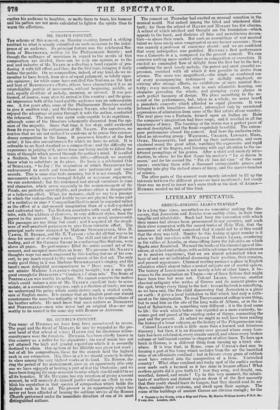MR. Linn/EEL'S CONCERT.
THE name of HUMMEL we have long been accustomed to revere. The pupil and the friend of MozArer, he may be regarded as the pre- sent heed of that school of which HAYDN and his illustrious fellow- Countrymen were the founders. HtJMMEL has been chiefly known in this country as a writer for the pianoforte ; his vocal music has not yet attained the high and general reputation which it is assuredly destined to claim. Our opinion of his Matilda was given last week ; but of all his compositions. those for the church hold the highest rank in our estimation. His. Mass in E wo should scarcely hesitate to class among the very highest works of its kind. Mr. BISHOP, du- ring the period of his management, gave us an opportunity (the only one we have enjoyed) of hearing a part of it at the Oratorios ; and we have been longing for some occasion to arise which should unfold to us all its beauties. If Mr. Hummel, has any intention of giving a second concert, he will scarcely do himself justice without an effort to esta- blish his reputation in that species of composition which holds the highest rank in his art. The present is an opportunity which has never yet been afforded of hearing the sublime service of the Roman Church performed under the immediate direction of one of its most crtsturgul—sted authors. The concert on Thursday had excited an unusual sensation in the musical world. Not indeed among the titled and whiskered dilet- tanti; for them the school of HAYDN and MOZART has few charms. A school of which intellect and thought are the foundation—which appeals to the heart, and disdains all false and meretricious decora- tion—is above their reach. But such an assemblage of real musical talent we have rarely seen congregated on any former occasion ; there was scarcely a professor of eminence absent : and we are confident that every anticipation was gratified. HUI■IMEL'S first performance was a Concerto in A Is, composed for the present concert. We can conceive nothing more perfect either in composition or execution. It excited an unmingled flow of delight from the first bar to the last; combining the most lovely melody, the purest and most graceful ex- pression, enriched with all which it was possible to derive from science. The score was magnificent—the single or combined use of every accompanying instrument so skilfully employed, no striving after strange effects, no exhibitions of mere manual tlex, terity ; every movement, too, was in such admirable keeping, one character pervading the whole, and grouping every phrase in such perfect harmony of design. We place something to the ac- count of the performance, but, taken as a whole, we never heard a pianoforte concerto which afforded us equal pleasure. It vvas listened to with breathless interest, interrupted only by occasional expressions of admiration from some of the first artists of out country. The next piece was a Fantasia, formed upon an Indian air. Here the composer's imagination had freer scope, and it revelled in all the luxuriance of fancy. The bursting of the storm was a perfect piece a musical description, and the finale exquisitely beautiful. The extem- pore performance closed the concert. And here the orchestra exhi- bited an interesting group : WEICHSEL, CRAMER, LINDLEY, Moat, OURY, DRAGONETTI, had packed up their instruments, and were clustered round the great artist, watching the expressive and rapid movements of his fingers, and listening with rapt attention to the un- fettered promptings of his genius. After a short and masterly intro- duction, he chose for his first theme his master's " La ci darem lz mano," and for his second the "Fin ch' ban dal vino" of the same opera; enriching them with a thousand unimaginable graces, and bringing into play the richest stores of fancy, and the master-touches of science.
The other parts of the concert were merely intended to fill up the intervals between the different pieces we have mentioned ; but surely there was no need to insert such mere trash as the duet of AUBER- HUMMEL needed no foil of this kind.


















 Previous page
Previous page